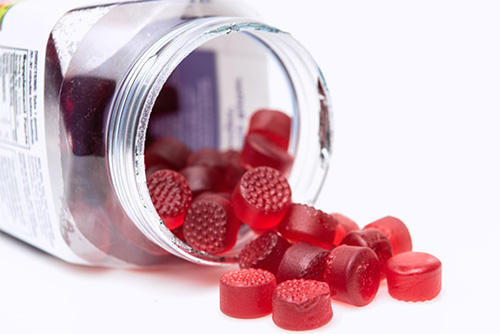
By WHN Editorial Team
They taste like a treat, but are gummy vitamins better for you than traditional vitamins? As you make decisions about the best supplements to fit your health needs, you deserve to know the not-so-sweet truth about gummy vitamins.
Gummy vitamins are packed with fillers — and not much else
Gummy vitamins are typically made from gelatin, corn starch and sugar, and lots of fillers and chemical additives. It’s in the nature of the beast – to make the gummy soft and chewable, it needs chemical additives and preservatives. These are often toxic. Beyond this mess, there’s simply not a lot of room left to add much else, so chances are you’re not really getting therapeutically significant amounts of nutrients when you take a gummy vitamin. The nutrients just won’t fit, especially if you are looking for a multi-nutrient daily support formula or special multi-nutrient support for hormonal issues or thyroid support, etc.
Gummy vitamins are held to lower standards
The FDA regulates gummy vitamins as food, not as supplements, which means that gummy vitamins are regulated with lower standards for what can and can’t be added compared to traditional vitamin supplements. When tested, gummies have a bad reputation for nutrient levels not matching what the label says.
How bad is this problem? According to a 2023 JAMA study, a test of 25 different brands of gummy vitamins containing the sleep hormone melatonin found that 22 gummy vitamin brands (88%) were inaccurately labeled. Incredibly, only three brands of melatonin gummies contained within 10% of the amount indicated on the label. Amounts of the sleep hormone in the other 22 samples ranged from 74% to 347% of what the label listed. One brand of gummies labeled as containing both melatonin and CBD (cannabidiol) turned up as containing no melatonin at all when tested.
It’s difficult to know how potent your vitamin is
Gummies have limited shelf stability compared to traditional vitamins and will start losing potency in less time. To counteract this, some manufacturers pack gummies with more nutrients than the label says to allow for their strength to wear off. As a result, this makes it even more difficult to determine exactly how much nutritional value you’re getting in your gummy when you take it. Too much? Too little? Just enough? It’s almost impossible to tell. The new melatonin study highlights these inconsistencies.
Gummy vitamins are no treat for your teeth
Gummy vitamins make taking your supplement as easy as popping a piece of candy — which is bad news for your teeth. Chewing on the vitamins can coat your teeth with sticky sugars that, over time, contribute to cavities and gum inflammation. And it’s not just the sugar. Citric acid in gummy vitamins poses a risk for wearing down tooth enamel.
It’s easy to take too many
If you’re struggling with sugar cravings, and it’s time to take your vitamins, you may find yourself eating a few too many. Not only are you potentially taking in too much of a certain nutrient (which can carry its own health risks), but you’re also getting a lot of sugar. Sugar-sweetened gummy vitamins typically have anywhere from 2 to 8 grams of sugar per serving. This might not sound like a lot, but when you take too many vitamins in one sitting, you can quickly exceed your sugar gram/carb intake goals for the day.
Sugar alcohols trigger digestive issues
Some gummy vitamins labeled “sugar free” are sweetened with erythritol, xylitol or other 0 carb sugar alcohols. Sugar alcohols are notorious for causing digestive distress, including bloating and diarrhea.
How can you make taking your vitamins easier?
Are you considering gummies because you just don’t like swallowing pills? A couple of tips we like to share: 1. grind your supplement (in a small blender or with a mortar and pestle) or 2. if it is in capsule form, simply open the cap, and then mix it in with a smoothie or glass of juice or flavored seltzer water. The women we help have let us know these simple “vitamin hacks” can be real game changers for getting the nutrients they need.
We’ve been making natural supplements for women for 21 years, and over that time, have constantly followed the latest research to guide best practices. Here’s our bottom line: Whenever a woman takes a vitamin supplement, it should be good for her! To learn more about how to choose the best supplements for your health needs, please read our feature article: 7 cardinal sins of multivitamins.










